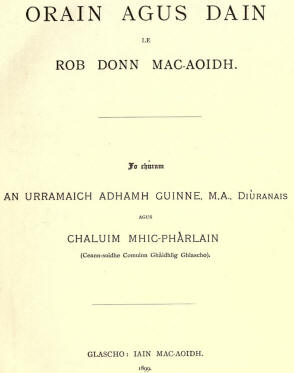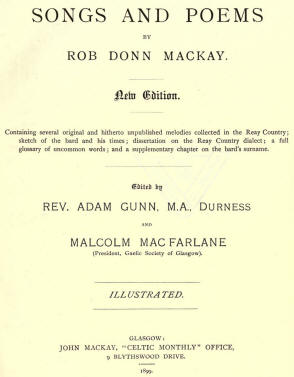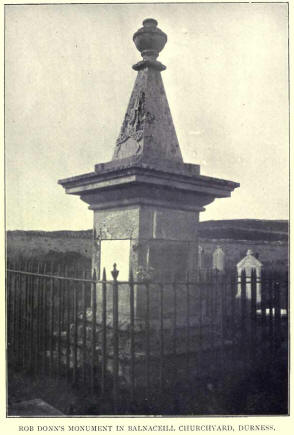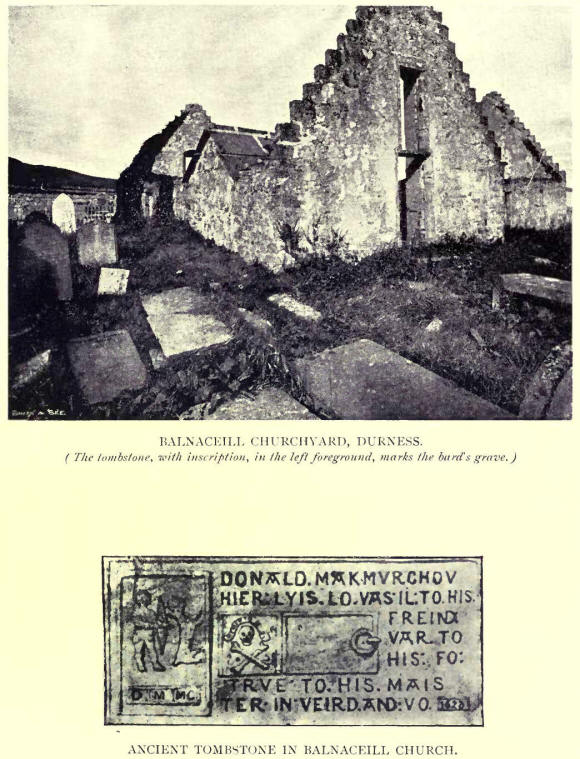|
Robert MacKay - Rob Donn
By Rev. John Kennedy from the Celtic Magazine (1888) (pdf)


 DEDICATION DEDICATION
TO JOHN MACKAY, ESQ., C.E., J.P.,
HEREFORD.
9 BLYTHSWOOD DRIVE,
Glasgow, June, 1899.
DEAR CLANSMAN,
The men who are capable of
distinguishing practical from impractical objects, and who are the more
active in making them practicable for others, are, in my opinion, most
deserving of honour. Pre-eminent amongst these it is my privilege to place
you, and I esteem it an honour to be able to make even this slight
acknowledgment of your patriotic and noble example. Without your keen
appreciation of what is most useful in advancing the prosperity and prestige
of the Gael. and without your incentive and never failing support,
influences which at the present time are active in this direction would, no
doubt, be dormant. Who is deserving of honour as a true and loyal Highlander
if you are not? You have been zealous in promoting a Gaelic culture,
especially in your native county, you have done a similar good service to
our clan, and your loyal devotion has had a beneficial effect upon the whole
Gaelic race. Our Celtic kinsmen across the waters have frequently and
gratefully acknowledged your generous help. Even in the publication of this
volume your stimulus was not awanting. It was undertaken chiefly through
your incentive and advice, and it was the desire to gain your commendation
which caused it to be carried out in a style in which no other Gaelic bard's
works have ever been issued. It is my esteemed privilege to dedicate to you,
the clansman of our gifted Sutherland bard, this edition of his works. I do
so with feelings of respect and gratitude; feelings which are universally
shared, I believe, by Gaels of every class, creed, and clan, who have the
cause of their country, race, and language at heart.
Yours faithfully,
JOHN MACKAY.
PREFACE
THE poetical works of Rob
Donn have already been published in three editions, the first in 1829, the
second in 1870, and the third so recent as last year. These several editions
agree in so far as they include such of the bard's compositions as are
worthy of preservation, much that is not, and probably some pieces which
were not his work at all. The first and third editions have each glossaries,
which are by no means complete. Generally speaking, the later editions
adhere to the text and orthography of the first, which, having been rendered
according to the literary usage of the time, gives an impression of
defective rhyme and rhythm. The only aim of the editors seems to have been
the rendering of the bard's meaning. The present edition has other important
claims on the reader's interest. The text has been revised and made to
conform, as nearly as can be advantageously done, to the bard's own native
dialect. By this change the ordinary reader loses nothing, while the student
gains much. A full and carefully compiled glossary of all the local words,
and dialectic forms of words used by the bard, as well as many which do not
occur in his works, with their meanings in the English language, and their
etymologies, where these can be given, together with a treatise on the Reay
Country pronunciation of Gaelic, is appended, and will be found of great
value.
The melodies of about fifty
pieces, taken principally from a manuscript collection of airs of Rob Donn's
songs noted down in the Reay Country by the late John Munro, a native of the
district, and printed in both notations, further enhance the work. The
surname of the bard has of late given rise to a good deal of controversy, in
view of which the chapter treating of that subject will doubtless be read
with more than ordinary interest.
It is doubtful if the
inclusion of every composition alleged to have been made by Rob Donn has
tended to increase the bard's reputation as such. Keeping this in view only
the principal compositions, and such of the minor pieces as were necessary
to display the style and range of subject which were his, are reproduced.
This volume is unique in many
ways. We do not know that the works and music of any Gaelic bard have ever
been published in this form before; indeed, we doubt if it would be possible
to give fifty of the songs of any other Gaelic bard set to the original
melodies. It is to the credit of Sutherland people that they have preserved
so well the old songs and the old music, of which we believe a great deal
could yet be taken down from the natives of the county.
It has often been stated that
Rob Donn has been fortunate above all other Gaelic bards in having so many
editions of his works published, and so much prominence given to them by
writers of distinction, such as Mr. J. G. Lockhart, son-in-law of Sir Walter
Scott, and others. However that may be, we have endeavoured in this instance
to present his songs and poems to our countrymen in as pleasing a form as
possible, with-such additional matter as we believe would add to their
interest.
ADAM GUNN,
MALCOLM MACFARLANE,
Joint-Editors.
An
Clar-Innsidh (Contents)
Going to this page you'll find the list of poems and songs and as most of
these songs are in the Gaelic language I have scanned each page as an image.
So all you need to do is check the Page number of the song you are
interested in reading and then return to this page and select the Page
number from the list below.
List of Subscribers

English Translations
-
Page 93 - The
Shieling Song
-
Page 94 - The
Drover's Lament, There's Nothing in the Garish Day
-
Page 95 - The Death
Song of Hugh, The Rispond Family Elegy
-
Page 96 - The Song
of Winter
-
Page 97 - Death,
Lament for Hugh MacKay
-
Page 98 - Lament
for Mr Murdoch, Elegy to John MacKay
-
Page 99 - 'Tis Thy
Death
-
Page 100 - Elegy
to Donald, Lord Reay
Musical Notes
Rob Donn and his Times
The Dialect of the Reay Country Bard
Glossary
The Bard's Surname
|

